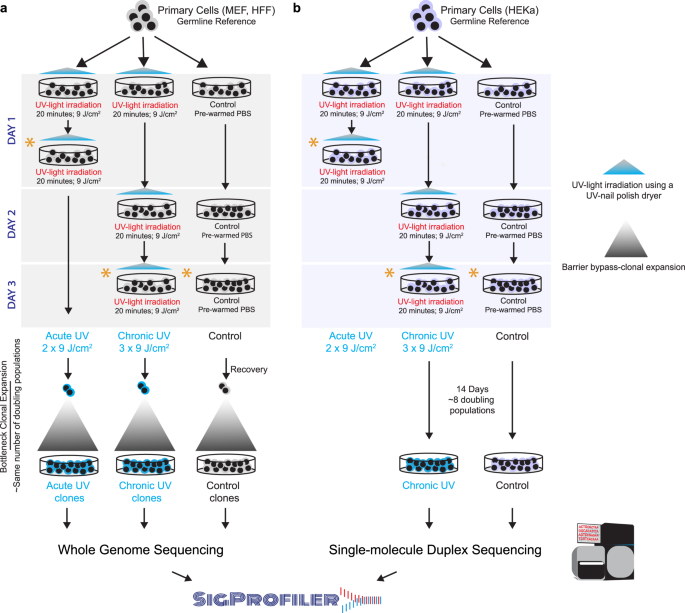アルツハイマー病などの神経変性疾患治療への新たなアプローチを示唆する発見 Findings suggest new approach to treating Alzheimer’s, other neurodegenerative diseases
2023-01-12 ワシントン大学セントルイス
・この研究では、腸内細菌が、短鎖脂肪酸などの化合物を産生することによって、全身の免疫細胞の挙動に影響を与え、その中には、脳組織を損傷してアルツハイマー病などの神経変性を悪化させる脳内細菌も含まれていることが、マウスを用いて明らかにされた。この研究成果は、1月13日発行の科学誌『Science』に掲載され、神経変性の予防や治療の方法として腸内細菌叢を再構築する可能性を示しています。
・アルツハイマー病の人の腸内細菌が、健康な人の腸内細菌と異なる可能性があるという証拠が蓄積されつつあります。しかし、こうした違いが病気の原因なのか結果なのか、あるいはその両方なのか、また、マイクロバイオームを変化させることが病気の経過にどのような影響を及ぼすのかは、明らかになっていない。
・そこで研究チームは、腸内細菌が病気の原因となっているかどうかを調べるため、アルツハイマー病のような脳障害や認知機能障害を起こしやすいマウスの腸内細菌を変化させた。このマウスは、ヒトの脳内タンパク質であるタウの変異型を発現するように遺伝子改変されており、タウは蓄積して神経細胞に損傷を与え、生後9カ月までに脳を萎縮させる。このマウスはまた、アルツハイマー病の主要な遺伝的危険因子であるヒトAPOE遺伝子の変異体も持っていた。APOE4の変異体を1つでも持つ人は、より一般的なAPOE3の変異体を持つ人に比べて3〜4倍も発症しやすいという。
<関連情報>
- https://source.wustl.edu/2023/01/gut-bacteria-affect-brain-health-mouse-study-shows/
- https://medicine.wustl.edu/news/gut-bacteria-affect-brain-health-mouse-study-shows/
- https://www.science.org/doi/10.1126/science.add1236
タウオパチーモデルマウスにおけるApoEアイソフォームとマイクロバイオータに依存した神経変性進行の解明 ApoE isoform– and microbiota-dependent progression of neurodegeneration in a mouse model of tauopathy
Dong-oh Seo,David O’Donnell ,Nimansha Jain,Jason D. Ulrich,Jasmin Herz,Yuhao Li,Mackenzie Lemieux ,Jiye Cheng,Hao Hu,Javier R. Serrano,Xin Bao,Emily Franke,Maria Karlsson,Martin Meier,Su Deng,Chandani Desai,Hemraj Dodiya,Janaki Lelwala-Guruge,Scott A. Handley,Jonathan Kipnis,Sangram S. Sisodia,Jeffrey I. Gordon,David M. Holtzman
Science Published:13 Jan 2023
DOI: 10.1126/science.add1236
Microbiota and tau-mediated disease
The accumulation of certain forms of the tau protein in the brain is linked to loss of nerve cells, inflammation, and cognitive decline in Alzheimer’s disease and several other neurodegenerative diseases. Apolipoprotein-E (APOE), the strongest genetic risk factor for Alzheimer’s disease, regulates brain inflammation and tau-mediated brain damage; however, the gut microbiota also regulates brain inflammation. In a mouse model of tau-mediated brain injury, Seo et al. found that manipulation of the gut microbiota resulted in a strong reduction of inflammation, tau pathology, and brain damage in a sex- and APOE-dependent manner (see the Perspective by Jain and Li). —SMH
Structured Abstract
INTRODUCTION
Alzheimer’s disease (AD) is characterized by early deposition of amyloid-β (Aβ) plaques followed by pathological tau accumulation. Although Aβ is a necessary factor in AD pathogenesis, its accumulation in and of itself is insufficient for neurodegeneration and cognitive decline. By contrast, pathological tau accumulation is closely linked with neurodegeneration and cognitive decline in AD and primary tauopathies. Alterations of the gut microbiota have been reported in AD, which suggests that the microbiota may contribute to AD progression. Animal studies to date have focused mainly on how gut microbiota alterations affect Aβ pathology and not tauopathy and neurodegeneration. Additionally, recent studies have suggested that apolipoprotein E (ApoE) isoforms, which strongly influence AD risk and regulate tau-mediated neurodegeneration, differentially affect the gut microbiota. Therefore, further investigations to characterize the contribution of the gut microbiota to tauopathy and neurodegeneration are important.
RATIONALE
We assess the hypothesis that the gut microbiota regulates tau pathology and tau-mediated neurodegeneration in an ApoE isoform–dependent manner. A mouse model of tauopathy (P301S tau transgenic mice) expressing human ApoE isoforms (ApoE3 and ApoE4), referred to as TE3 and TE4, was subjected to the manipulation of the gut microbiota using two approaches: (i) being raised in germ-free (GF) conditions and (ii) short-term antibiotic (ABX) treatment early in life. Animals were fed a standard mouse chow diet ad libitum until euthanasia at 40 weeks of age, when this mouse model typically has severe brain atrophy.
RESULTS
The gut microbiota manipulations resulted in a notable reduction of tau pathology and neurodegeneration in an ApoE isoform–dependent manner. Both male and female GF TE4 mice showed a marked decrease in brain atrophy compared with conventionally raised (Conv-R) mice. Conv-R ABX-treated TE3 mice had significantly milder hippocampal atrophy compared with controls. ABX-treated TE4 animals showed trends of milder hippocampal atrophy, but the effect did not achieve statistical significance. These phenotypic effects of ABX treatment were not observed in females.
Male GF TE4 mice and male ABX-treated TE3 mice showed significantly lower phosphorylated tau (p-tau) in the hippocampus compared with their controls. Astrocyte and microglial morphology and transcriptomic analysis revealed that the manipulation of the gut microbiota drives glial cells to a more homeostatic-like state, which indicates that gut microbiota strongly influence neuroinflammation and tau-mediated neurodegeneration. Microbiome and metabolite analysis suggests that microbially produced short-chain fatty acids (SCFAs) are mediators of the neuroinflammation-neurodegeneration axis. Supplementation of SCFAs to GF TE4 mice resulted in more reactive glial morphologies and gene expression as well as increased p-tau pathology.
CONCLUSION
The findings reveal mechanistic and translationally relevant interrelationships between the microbiota, the immune response, and tau-mediated neurodegeneration. ApoE-associated gut microbiota targeting may provide an avenue to further explore the prevention or treatment of AD and primary tauopathies.
P301S tau transgenic mice expressing human APOE (TE mice).
The dysregulated gut-brain axis and its effect on tauopathy and tau-mediated neurodegeneration. Dysbiosis, unbalanced gut microbiota composition (bottom center), contributes to tau-mediated neurodegeneration by generating bacterial metabolites (e.g., SCFAs) that influence peripheral immune cells. These cells promote central nervous system (CNS) inflammation and contribute to tau aggregation and neurodegeneration. Short-term antibiotics (bottom right) or germ-free conditions (bottom left) reshape or eliminate gut microbiota and reduce their metabolites. These microbiota manipulations influence effects of peripheral immune cells on CNS inflammation and tau-mediated neurodegeneration. ApoE4 in the CNS exacerbates local toxicity and blood-brain barrier dysfunction.
Abstract
Tau-mediated neurodegeneration is a hallmark of Alzheimer’s disease. Primary tauopathies are characterized by pathological tau accumulation and neuronal and synaptic loss. Apolipoprotein E (ApoE)–mediated neuroinflammation is involved in the progression of tau-mediated neurodegeneration, and emerging evidence suggests that the gut microbiota regulates neuroinflammation in an APOE genotype–dependent manner. However, evidence of a causal link between the microbiota and tau-mediated neurodegeneration is lacking. In this study, we characterized a genetically engineered mouse model of tauopathy expressing human ApoE isoforms reared under germ-free conditions or after perturbation of their gut microbiota with antibiotics. Both of these manipulations reduced gliosis, tau pathology, and neurodegeneration in a sex- and ApoE isoform–dependent manner. The findings reveal mechanistic and translationally relevant interrelationships between the microbiota, neuroinflammation, and tau-mediated neurodegeneration.



